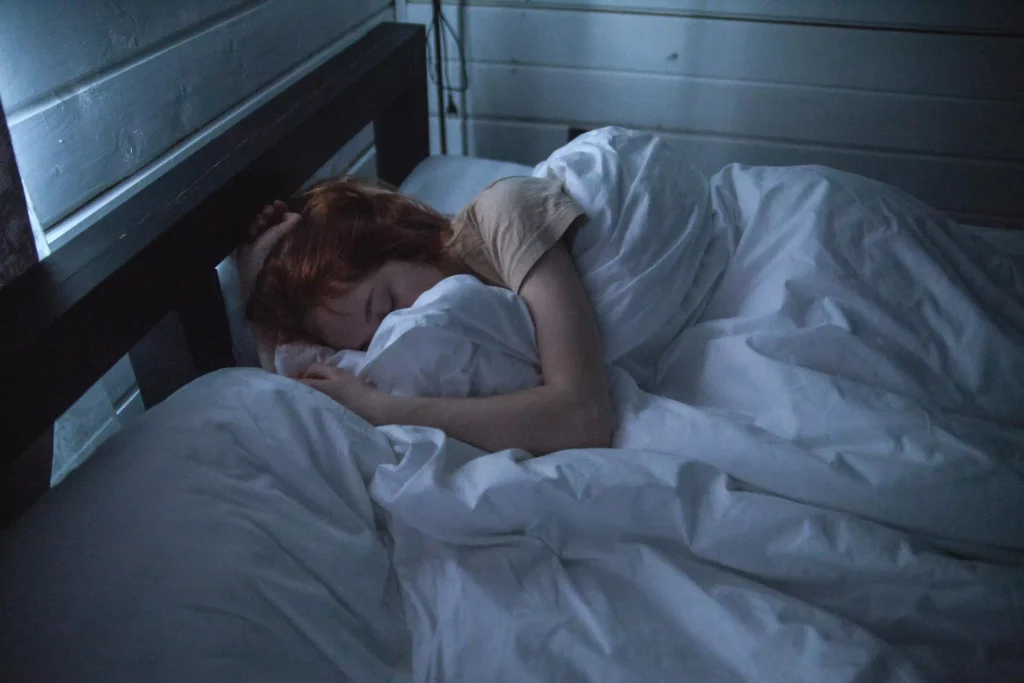Introduction: Understanding the Link Between Insomnia and Depression

Can Insomnia Cause Depression? This is one of the usual anxieties of the people who are not able to sleep. Depression and insomnia are two inseparable conditions because long-term sleep disturbances may greatly affect mood control. In the long run, chronic insomnia can render the brain susceptible to depressive attacks. This relationship can be essential in preserving mental health and identification of early warning signs to prevent depression when such an outcome occurs.
Table of Contents
What is Insomnia?
Insomnia is a sleeping disorder where there is a problem in falling asleep, maintaining sleep or rising up in the morning too early and mostly results in fatigue, irritation and poor functioning during the day.
How Sleep Deprivation Impacts Mental Health
The question many are asking is Can Insomnia Cause Depression, as a result of insomnia? Sleep deprivation alters the neurotransmitter balance, which influences mood, attention and emotional stability. Persistent insomnia may escalate irritability and anxiety as well as be susceptible to depressive symptoms. Individuals who endure chronic insomnia usually have problems coping with daily stress, which also affects mental health. Restorative sleep is a key priority towards emotional resilience and general well-being of the psyche.
Changes in Brain Chemistry Due to Chronic Insomnia
Can Insomnia Cause Depression due to a change in brain chemistry? Yes–chronic insomnia influences the levels of serotonin and dopamine which are vital in regulating mood. Loss of sleep also affects parts of the brain such as the hippocampus and prefrontal cortex which affect memory, decision-making, and control of emotions. All these chemical and structural transformations that occur with time raise the risk of depression and anxiety, and it demonstrates the importance of mental health in insomnia treatment.
Insomnia as a Trigger for Depressive Episodes

Constant insomnia may have a direct role in triggering depression. Can insomnia cause depression? Yes, it produces a circle of exhaustion, impatience, and despair. Sleeplessness makes people less stress-resilient and the everyday life appears to be overwhelming. Patients who have long-term insomnia can become depressed and lose the desire to engage in activities, which are typical depression symptoms. Insomnia can be avoided at early stages before it develops into entire depressive episodes.
The Role of Stress and Anxiety in Sleep Loss
Can insomnia cause depression? and this is often explained by stress and anxiety. Stress causes high levels of cortisol, which disrupts relaxation of the body to get restful sleep. Poor sleep also contributes to the mood disorders and this leads to a vicious cycle. The key to stopping this cycle and enhancing sleep quality and ensuring the mental health is not harmed by the effects of chronic insomnia lies in dealing with stress and anxiety.
How Poor Sleep Patterns Worsen Depression Symptoms
Can insomnia cause depression? Sleep disturbances may greatly exacerbate the depressive symptoms. The abnormal sleep habits, frequent wakefulness, and inability to sleep cause sleep deprivation by disrupting the normal rhythm of the brain hence resulting into the individual becoming irritable, fatigued and experiencing mood swings. Chronic insomnia puts a person at risk of stress and negative thoughts, which worsen hopelessness. Regular sleep schedules are very vital in ensuring that insomnia does not worsen depression and helps in enhancing an individual emotional health.
Treatment Options for Insomnia to Prevent Depression
Insomnia should be treated properly in order to prevent depression. Can insomnia cause depression? Yes, sleep disturbances are untreated and aggravate the risk of depression. The ways of treatment are cognitive-behavioral therapy of insomnia (CBT-I), sleep hygiene measures, and eventually medicine prescribed by a physician. The integration of therapy with lifestyle changes tends to enhance the quality of sleep, mood stabilization, and diminishes the risk of getting depressive episodes.
Lifestyle Changes to Improve Sleep and Mental Health
Can insomnia cause depression?The connection may be interrupted with lifestyle changes. Normal exercise, reducing caffeine, setting a regular bedtime, and preparing a cozy sleeping space also enhances the quality of sleep, as well as mental wellbeing. Mindfulness, meditation, and reduced screen time before sleep help to achieve emotional stability. It can be easier to preserve sleep as a predictor or even an aggravator of depression through healthy lifestyle choices, which will help a person feel more at ease.
When to Seek Professional Help for Sleep and Depression

When the sleeping problems continue, then one should seek medical advice. Can insomnia cause depression?? Continuous insomnia and mood swings can be signs of underlying depression which should be treated by a professional. Symptoms can be examined by sleep specialists, psychologists, or psychiatrists and prescribe therapies, including CBT-I, counseling, or drugs. Early intervention enhances sleep behaviors, eliminates depressive symptoms, and averts the development of mental health complications in long-term.
Conclusion
Do insomnia and depression go together? The linkage is evident: chronic lack of sleep not only aggravates the mood, but can also lead to depressive seizures. Treating insomnia by proper treatment, lifestyle modification and managing stress is vital on defending the mental health. Early intervention is more beneficial in the quality of sleep, development of emotional resilience, and mitigation of the long-term depression risk. Sleep is essential in the process of achieving mental and physical health.
1. Can Insomnia Really Lead to Depression?
Indeed, chronic insomnia may result into depression due to the distortion of mood control and emotional stability. Insomnia repeatedly leads to the development of the depressive symptoms in the long-run.
Can insomnia cause depression? Absolutely. Chronic insomnia impacts the brain to control emotions, exposing people to sadness, irritability, and hopelessness. Sleep deprivation interferes with such neurotransmitters as serotonin and dopamine, which play an important role in mood. In the long-term, persistent sleeping difficulties may produce depressive episodes particularly where there is a combination with stress or anxiety. Early detection and management of insomnia can be used to avoid mental health problems in the long-term.
2. How Does Lack of Sleep Affect Mental Health?
Sleep deprivation affects mental health in a negative manner by making it exhausting, irritated, unable to concentrate and more anxious, which can lead to the onset of depression.
Can insomnia cause depression? Yes, because sleep is necessary to the emotional balance and mental activity. Constant sleep deprivation influences the amygdala and prefrontal cortex, leading to inability to make a decision and regulate emotions. The result of this disruption is stress and anxiety, which leads to a cycle that can be followed by the depressive symptoms. It is important to maintain the same sleep patterns and give priority to restorative sleep as the key to safeguarding the mental state and minimizing the chances of depression development.
3. Why Does Chronic Insomnia Increase the Risk of Depression?
Chronic insomnia is a risk factor of depression because it changes the brain chemistry by causing emotional imbalance and reducing stress resilience, which exposes a person to ongoing depressive symptoms.
Can insomnia cause depression? The long-term effects of insomnia are the alteration of the levels of neurotransmitters such as serotonin and dopamine, which play vital roles in the process of mood regulation. The hippocampus and prefrontal cortex, the regions in charge of memory and emotions, are also affected by sleep loss. This neurological alteration lowers the capability of the brain to withstand stress making it prone to depression. Insomnia can be averted through early treatment, behavioral changes, or pharmaceutical care to ensure that the condition does not develop into a severe mental illness.
4. Can Depression Develop from Short-Term Sleep Problems?
Sleep problems, including short-term ones, may contribute to depressive symptoms, particularly in the presence of stress or anxiety, though insomnia in the long-term is more strongly correlated with depression.
Can insomnia cause depression even in short-term cases? Though a short-term insomnia does not necessarily result in full-fledged depression, the repetition or severe short-term sleep disturbance elevates irritability, exhaustion, and anxiety. The following factors form the basis of depressive symptoms. Short-term insomnia development can be prevented by early management on the basis of sleep hygiene, relaxation techniques, and stress reduction to avoid the development of chronic sleep problems and further severe depression, which have a damaging impact on mental health in general.
5. How Are Insomnia and Depression Linked in the Brain?
The relationships between insomnia and depression are connected with brain systems and neurotransmitters that control the mood, including serotonin, dopamine, the prefrontal cortex, and the amygdala.
Can insomnia cause depression by changing brain? Yes, studies indicate insomnia destabilizes the communication between the prefrontal cortex and the amygdala, which are used to regulate emotions. Further destabilizing the mood is an imbalance in neurotransmitters, which is low serotonin and low dopamine. Such neurological disturbances make one prone to stress, anxiety, and episodes of depression. This linkage of the brain highlights the need to ensure that insomnia is treated immediately in order to rejuvenate the normal sleep patterns and safeguard the mental health against chronic depression.
6. Can Treating Insomnia Prevent Depression?
Yes, insomnia can be treated effectively and depression risk may be decreased. Restoration of proper sleep enhances mood, emotional stability and brain activity, and reduces the chances of exhibiting symptoms of depression in the long run.
Can insomnia cause depression when left untreated? Yea, sleep deprivation over a long period makes a person susceptible to depression. Cognitive-behavioral therapy, sleep hygiene or medical interventions are treatment options that can address insomnia and bring a normal period in sleep and normalize the level of neurotransmitters. With a higher quality of sleep, people have better mood regulation, lower levels of anxiety, and are capable of dealing with stress, preventing the onset or exacerbation of depression. Protection of the long-term mental health depends on early intervention.
7. What Are the Warning Signs That Insomnia Is Affecting Mood?
Such warning signs are constant fatigue, irritability, lack of motivation, inability to focus, more anxiety, and feelings of sadness, which can be evidence that insomnia is affecting emotional health.
Can insomnia cause depression? Rest, rest, rest, yes, at least when mood starts to be perturbed by sleep disturbances. The main warning signs consist of irritability, emotional sensitivity, lack of focus, exhaustion and hopelessness. People can also experience an exaggerated anxiety or frustration in day-to-day experiences. These signs can be identified at the earliest stage, which allows taking timely measures, such as adopting better sleeping habits or therapy to prevent the development of insomnia into extensive depressive episodes, and safeguard mental health.
8. Can Anxiety from Insomnia Trigger Depression?
Yes, depression can be brought on by anxiety brought about by insomnia. Constant anxiety and disturbance of sleep cause a vicious circle of emotional dysfunction, which leads to growing vulnerability to depressive symptoms with time.
Can insomnia cause depression by way of anxiety? Absolutely. Chronic insomnia usually increases the levels of stress and anxiety and interferes with the process of relaxation and recovery. This increased level of emotional state aggravates irritability, negative thoughts, and fatigue, which are all factors that lead to depression. Anxiety, emotional stability, and even depression caused by insomnia could be minimized by interrupting the cycle with relaxation, cognitive therapy, and appropriate sleeping habits.